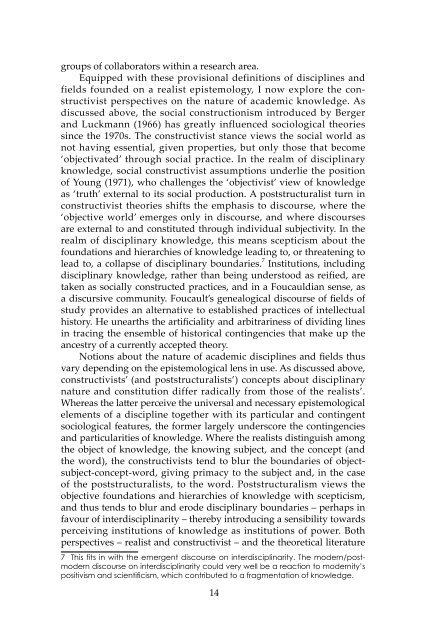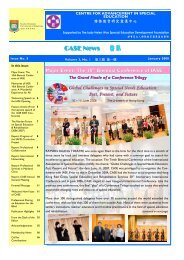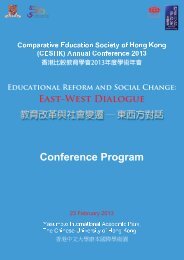Comparative Education Bulletin - Faculty of Education - The ...
Comparative Education Bulletin - Faculty of Education - The ...
Comparative Education Bulletin - Faculty of Education - The ...
You also want an ePaper? Increase the reach of your titles
YUMPU automatically turns print PDFs into web optimized ePapers that Google loves.
groups <strong>of</strong> collaborators within a research area.<br />
Equipped with these provisional definitions <strong>of</strong> disciplines and<br />
fields founded on a realist epistemology, I now explore the constructivist<br />
perspectives on the nature <strong>of</strong> academic knowledge. As<br />
discussed above, the social constructionism introduced by Berger<br />
and Luckmann (1966) has greatly influenced sociological theories<br />
since the 1970s. <strong>The</strong> constructivist stance views the social world as<br />
not having essential, given properties, but only those that become<br />
‘objectivated’ through social practice. In the realm <strong>of</strong> disciplinary<br />
knowledge, social constructivist assumptions underlie the position<br />
<strong>of</strong> Young (1971), who challenges the ‘objectivist’ view <strong>of</strong> knowledge<br />
as ‘truth’ external to its social production. A poststructuralist turn in<br />
constructivist theories shifts the emphasis to discourse, where the<br />
‘objective world’ emerges only in discourse, and where discourses<br />
are external to and constituted through individual subjectivity. In the<br />
realm <strong>of</strong> disciplinary knowledge, this means scepticism about the<br />
foundations and hierarchies <strong>of</strong> knowledge leading to, or threatening to<br />
lead to, a collapse <strong>of</strong> disciplinary boundaries. 7 Institutions, including<br />
disciplinary knowledge, rather than being understood as reified, are<br />
taken as socially constructed practices, and in a Foucauldian sense, as<br />
a discursive community. Foucault’s genealogical discourse <strong>of</strong> fields <strong>of</strong><br />
study provides an alternative to established practices <strong>of</strong> intellectual<br />
history. He unearths the artificiality and arbitrariness <strong>of</strong> dividing lines<br />
in tracing the ensemble <strong>of</strong> historical contingencies that make up the<br />
ancestry <strong>of</strong> a currently accepted theory.<br />
Notions about the nature <strong>of</strong> academic disciplines and fields thus<br />
vary depending on the epistemological lens in use. As discussed above,<br />
constructivists’ (and poststructuralists’) concepts about disciplinary<br />
nature and constitution differ radically from those <strong>of</strong> the realists’.<br />
Whereas the latter perceive the universal and necessary epistemological<br />
elements <strong>of</strong> a discipline together with its particular and contingent<br />
sociological features, the former largely underscore the contingencies<br />
and particularities <strong>of</strong> knowledge. Where the realists distinguish among<br />
the object <strong>of</strong> knowledge, the knowing subject, and the concept (and<br />
the word), the constructivists tend to blur the boundaries <strong>of</strong> objectsubject-concept-word,<br />
giving primacy to the subject and, in the case<br />
<strong>of</strong> the poststructuralists, to the word. Poststructuralism views the<br />
objective foundations and hierarchies <strong>of</strong> knowledge with scepticism,<br />
and thus tends to blur and erode disciplinary boundaries – perhaps in<br />
favour <strong>of</strong> interdisciplinarity – thereby introducing a sensibility towards<br />
perceiving institutions <strong>of</strong> knowledge as institutions <strong>of</strong> power. Both<br />
perspectives – realist and constructivist – and the theoretical literature<br />
7 This fits in with the emergent discourse on interdisciplinarity. <strong>The</strong> modern/postmodern<br />
discourse on interdisciplinarity could very well be a reaction to modernity’s<br />
positivism and scientificism, which contributed to a fragmentation <strong>of</strong> knowledge.<br />
14
















